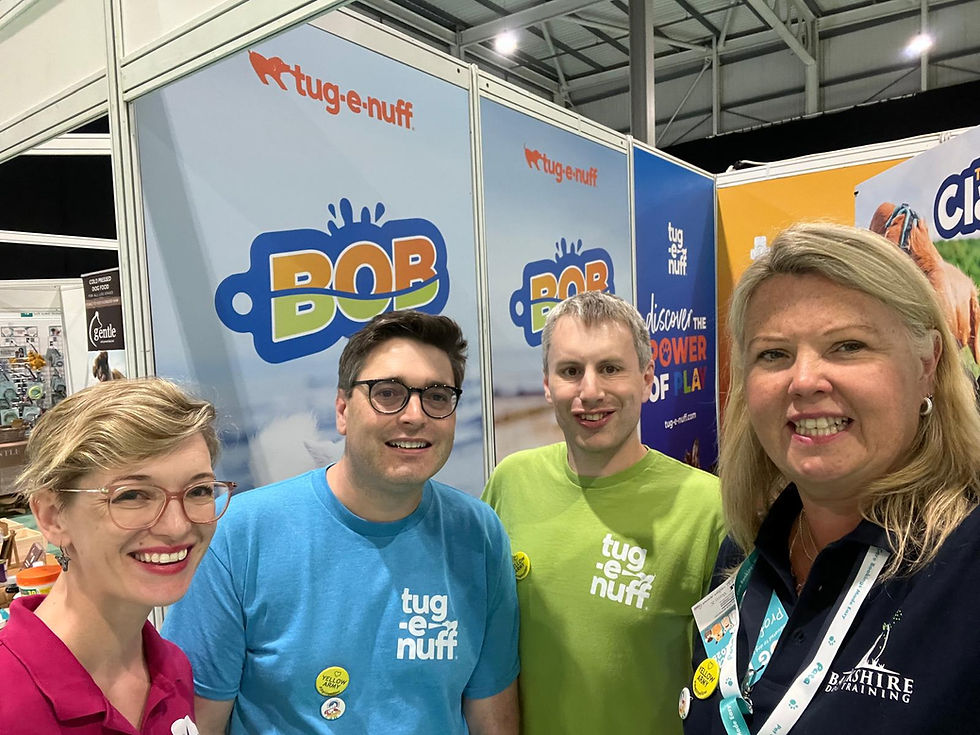Why should I come back? — Helping your dog understand motivation through rewards
- Sarah at Barkshire Dog Training

- May 1, 2025
- 4 min read
Updated: Sep 6, 2025
Summary:
When your dog makes the choice to return to you — especially in the face of something exciting like a squirrel or a fluttering leaf — that decision deserves recognition. This blog explores how understanding your dog’s motivation and using a Reward Ladder can turn everyday distractions into training wins. By rewarding fairly, staying patient, and tapping into what really matters to your dog, you’ll build not only stronger recall, but a deeper, more trusting bond.
Have you ever asked yourself why you go to the gym, or why you're trying to learn something new?
Chances are, there's a reason — maybe it’s a holiday goal, a feeling of pride, or a moment of peace after a long day. That motivation matters. It gives our effort purpose. And our dogs? They need that too.
Whether you’re calling your dog away from a squirrel, a fluttering feather, or the scent of a rabbit — you’re asking them to make a big decision. And to make that decision consistently, they need to know it’s worth it. That’s where the hierarchy of rewards comes in.
What is a reward ladder?
Put simply: not all rewards are created equal.
Your dog needs to believe that coming back to you is just as exciting, if not more so, than whatever they were about to chase.
Here’s how I explain it to clients here in Reading, Berkshire:
Bottom rungs:
Calm check-ins on a quiet walk along the Thames path or through Prospect Park? A gentle “good dog,” a little scratch behind the ears, maybe a bit of kibble.
Middle rungs:
Choosing to pause or walk past another dog on Christchurch Meadows when asked? Now we’re upping the game — bring out a toy, offer sniff time, or use a tastier treat.
Top rungs:
Turning away from a squirrel in Caversham Court Gardens? Coming back from a deer track in Sulham woods? That’s huge. It calls for something special — a jackpot reward, a game of chase, or even a moment of shared excitement watching the world together.
🐾 Client Story: The pomsky who loved a party
I worked with a wonderful Pomsky in central Reading whose recall was hit and miss. He loved other dogs and would often choose a quick hello over listening to his guardians. Because he was on a restricted diet, we couldn’t vary his food rewards — so we got creative.
By using verbal encouragement and turning his recall into a game of chase (throwing the treat so he could run after it), we showed him that listening to his humans could be just as exciting as saying hi to a new friend.
It wasn’t about the food — it was about fun.
Common missteps — and how to reframe them
Many clients think one treat or a quick 10-second play is enough. But for a dog giving up something really valuable, that’s like being offered a penny for a pound.
If we extend the play, deliver multiple treats, or build in time to just be with us after a recall, we show our dogs it’s worth it.
It becomes a moment of connection, not just a transaction.
Trust & choice: the heart of motivation
Understanding reward value does something powerful: it builds trust.
When our dogs know that choosing us leads to something good, they start checking in more often. They might even pause before chasing — as if to say, “Shall I?”
That moment is magic. That’s a partnership forming.
Why patience matters
Training doesn’t always go to plan.
The environment is constantly changing — especially in busy areas like Forbury Gardens or the fields around Emmer Green — and it’s easy to feel frustrated when our dogs don’t respond the way we hoped.
Maybe our tone gets sharper. Maybe we start repeating cues. But think about it — if your dog thinks you’re cross, why would they come back?
Patience helps us pause and ask:
“Why didn’t that work just now?”
“What could I try differently next time?”
“Is there a better motivator for this moment?”
Want to build your dog’s reward ladder?
I’ve created a simple, printable Reward Ladder Worksheet to help you figure out what truly motivates your dog — from quiet walks to high-stakes wildlife distractions.
➡️ Just reply to this blog or message me at Barkshire Dog Training and I’ll send it straight to your inbox!
Final thoughts
Every dog is different — but all dogs are capable of choosing connection over instinct, when we make it worthwhile.
When we listen, reward fairly, and stay curious about what drives them, we become someone worth coming back to.
At Barkshire Dog Training in Reading, Berkshire, everything we do is rooted in Patience, Connection, Fun, and Kindness. And this is a perfect example of how all four come together.
Wishing you a season full of sunny walks, wagging tails, and little moments of magic.







Comments